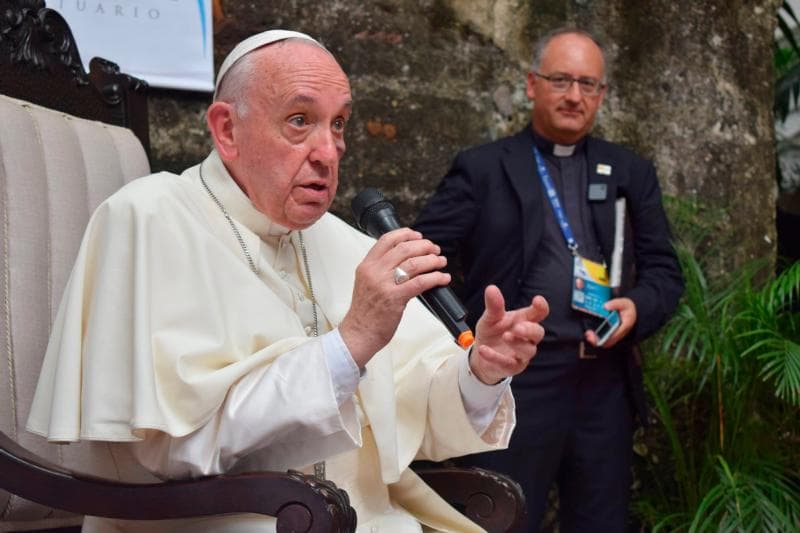ROME – On Sunday, Pope Francis paid a visit to the Jesuit headquarters in Rome, which he typically does in the month of July in honor of the feast of the founder of the Society of Jesus, Saint Ignatius of Loyola, celebrated July 31.
Francis makes regular visits to the offices, and on this occasion had lunch with over 45 Jesuits following a private conversation with the Jesuit Father General, Venezuelan Father Arturo Sosa, who recently returned from a visit to Asia.
In comments to Crux, Canadian Jesuit Father Pierre Belanger, who oversees the society’s website and newsletter, said Francis’s relationship with the Jesuits “is normal” in the sense that at an official level between the society and Holy See, it is like that of any other Catholic order.
However, given Francis’s own Jesuit background, “when he speaks with the Jesuits it’s in a personal way,” Belanger said.
This personal touch from the Argentine pontiff has a great deal to do with his own roots, having entered his novitiate with the Society of Jesus in 1958, making full religious vows in 1960, and being ordained a priest in 1969.
Yet aside from his own involvement, the religious order is also where some of the pope’s greatest intellectual and tone-setting influences have come from, and it is also where some of his closest allies are found.
To give two examples, perhaps the two greatest theological influences on the pope have been Father Pedro Arrupe and Father Henri de Lubac, both of whom were Jesuits and both of whom can still be felt in Francis’s words and writings.
Arrupe, a Basque who led the Society of Jesus from 1965-83, is known to have been one of the order’s most controversial leaders, and he was also close to a young Father Bergoglio.
It was Arrupe who in 1973 appointed Bergoglio the Jesuit provincial of Argentina, and Bergoglio was known to be sympathetic to Arrupe’s attempted reforms of the order following the Second Vatican Council (1962-65).
Under Arrupe, whose tenure overlapped the immediate aftermath of the council, the Jesuits tried to embrace the spirit of Vatican II, plunging into a widespread reform hinged on social action and a preferential option for the poor.
Arrupe died in 1991, however, his influence on the now-Pope Francis is unmistakable for most Jesuits, a fact cemented by the opening of Arrupe’s cause for sainthood in February of this year.
On the other hand, Henri de Lubac, a French Jesuit widely considered to be among the most influential theologians of the 20th century, is also a major intellectual influence for Francis.
Born in 1896, de Lubac was hugely influential in the Second Vatican Council, and he was an intellectual favorite of both St. John Paul II, who named him a cardinal, and retired Pope Benedict XVI.
De Lubac’s writings and doctrinal research played a key role in shaping the Council’s take on ecclesiology, in particular. One of his primary concerns was to understand the Church as a community of the whole People of God, rather than just the clergy – a concept which can still be heard in Francis’s continual blasting of clericalism and his references to the “one, holy People of God.”
Apart from his intellectual preferences, two of Francis’s current close advisors also come from within the Society: Father Antonio Spadaro, director of the Jesuit-run Italian journal La Civilta Cattolica, and Cardinal Luis Ladaria, head of the Vatican’s Congregation for the Doctrine of the Faith.
Appointed as head of the CDF in July 2017 following the removal of German Cardinal Gerhard Müller from the post that same month, Ladaria has become a Francis confidant, and remains one of the pope’s few allies inside the Roman Curia.
Whenever Ladaria issues a statement or clarification from the congregation, it is assumed that he is both acting on and communicating the will of the pope – an assumption that could not always be made when Müller was still in office.
Spadaro, on the other hand, was one of Francis’s first recognizable allies after his election in 2013; not only does Spadaro accompany the pope on every international trip, but he is often treated like a member of the pope’s official delegation.
Each time Francis visits a country where Jesuits are present, he pays a visit to the local community, and the text of the conversation is later published by Spadaro in La Civilta Cattolica. He has published several books on Francis and has pitched numerous ideas for projects that the pope has accepted, such as a children’s book published in 2016 consisting of the pontiff’s answers to letters and drawings he received from children around the world.
However, despite the pontiff’s favor, Spadaro also caused some trouble for the pope in the aftermath of a controversial article he co-authored with Argentine Protestant Rev. Marcelo Figueroa, also a close papal ally, in July 2017 which posited an “ecumenism of hate” in the U.S. between conservative Catholics and Evangelicals.
The article created waves in global Catholicism, mostly among American Catholics, with many believing that since Spadaro and Figueroa were close to the pope, and because La Civilta Cattolica is supposedly vetted by the Vatican Secretary of State before publication, that the article represented the mind of the pope.
Long seen as a quasi-spokesman for the Argentine pope, Spadaro was less visible in the immediate aftermath of the article, though he is still considered an influential figure in Francis’s papacy with the potential to impact major papal decisions and appointments.
Follow Elise Harris on Twitter: @eharris_it
Crux is dedicated to smart, wired and independent reporting on the Vatican and worldwide Catholic Church. That kind of reporting doesn’t come cheap, and we need your support. You can help Crux by giving a small amount monthly, or with a onetime gift. Please remember, Crux is a for-profit organization, so contributions are not tax-deductible.












